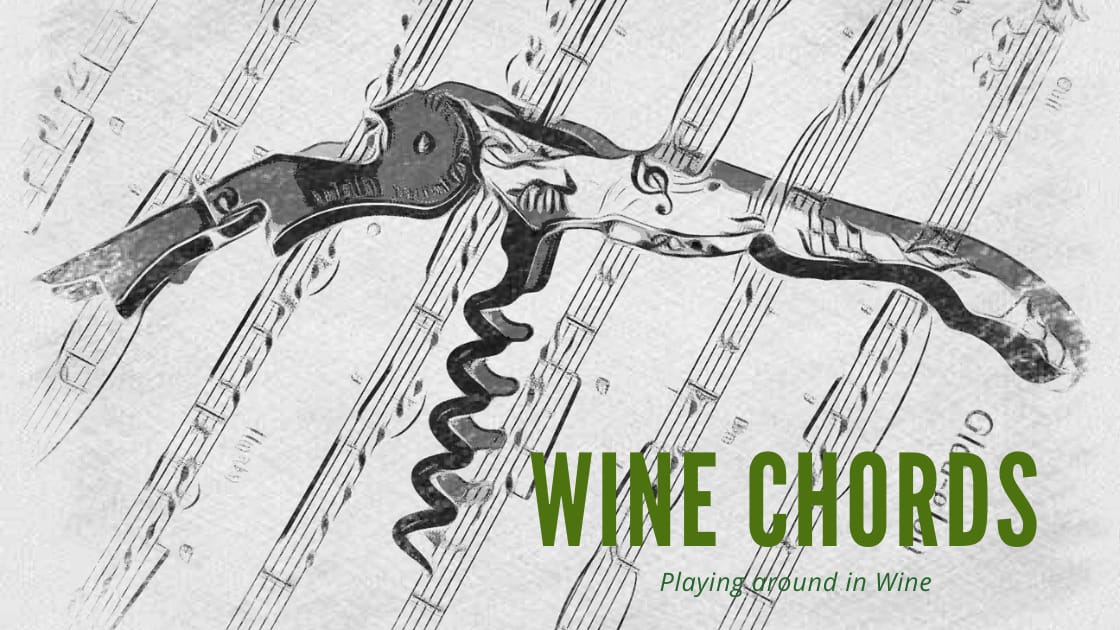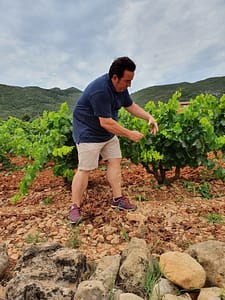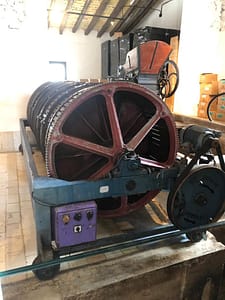First time I met Pepe Mendoza was at the family firm in L’Alfàs (Alfaz del Pi in castellano). It has taken him a lot of thinking, maturing and experimenting since then, to bring him where he is now. Geographically speaking he has established himself in Llíber (near Xaló, or Jalón) in the eastern part of the Alicante province. But in terms of enology and philosophy he has moved from thinking of France as the original that could be copied anywhere, to a sense of identity, could we say “homeness”, to his native Mediterranean landscape.
As Pepe points out, “I love sauvignon blanc, but why should it be grown here?”. And wandering through the vineyards with his dearly beloved moscatel, giró and monastrell plants, caressing them and saying on behalf of them, “I am home, I like it here” – he tells the tale of so many cabernet sauvignon that felt uncomfortable, “stressed”.
We are in Valle de Pop in Marina Alta, the only valley where the red varieties mature before the white.
It’s not often that you think that the Mediterranean could offer such a freshness. But the ventilation from both sides does it. For Pepe this is perfect; small production, balance, a collaboration with nature: “You give me fruit, and I care for it and promise not to exploit it.”
Upon arrival Pepe served us a perfect opening wine, a light and aromatic moscatel/airén/macabeo blend; moscatel from Marina Alta and the others from highter up the Vinalopó river, mellow, a touch of salt, and gentle as the breeze in the valley. The wine is called Paisaje, but the label only shows his name and the denomination Alicante. Here it was accompanied by some light tapas. “When determining what kind of wines to make I think of what do I like to eat: I like the dishes that my grandmother made, because they are made from local produce, organically grown and cooked slowly.”
Pureza 2019 is a 6 days skin-contact moscatel from coastal Marina Alta, aged in amphoras from master Juan Padilla in Albacete. The wine is light in colour, but has evident peel aromas (orange peel), fresh rose, mint; some volume in the mouth, with an uplifting acidity and a saline and slightly bitter finish. (Read more about this wine here.)
Mares de Luz Monastrell-Giró is a coupage of the two mentioned grapes (monastrell and giró), made with whole bunches. Light cherry; raspberry, mature cherry, some balsamic (laurel), rich with warning alcohol (14%), super acidity, long.
Giró de Abargues 2019 is a varietal giró from a single parcel in the Marina Alta. There is only a total of 90 hectars of giró in the world, so this is quite rare. It stayed one year in a 500 liter barrel. A wonderful light extracted and elegant wine: Light ruby; red fruits, paprika, lightly balsamic (laurel again), lavender; great concentration, evident but delicate tannnins.
Sero-roSé Monastrell Clásico 2016
As it says on the label it has stayed 14 months in lightly toasted 2-3 year old Allier casks. Blood-orange colour, a hint of light amber. Aroma of orange peel, or maybe dried orange, red fruits (raspberry), herbs; quite glyceric, but good acidity.
Gironet Nat ‘ 2020 comes with the subtitle “varieties not sufficiently reknown”. This is the giró, but a clone called gironet from the finca Abargues. It’s wine made with minimal intervention and almost no added sulphites. Red ruby; red fruits, anise, a touch lactic (yoghurt), some greenness, balsamic; very delicate and with a wonderful balance.
El Veneno 2019 is a monastrell wine from further inland, in what Pepe calls “pre-meseta”. We are talking about Alto Vinalopó, near Villena near the border against Murcia and Albacete (Castilla-La Mancha). Here are sandy loam and calcareous soils. This wine, aged one year in 500 liter barrel, is a more heady wine: Dark cherry in colour, aromas of blackberry, but also less evident hints like dried thyme or laurel, and a touch of paprika and spice; generous in the mouth, rounded and with hints of toast and coffee, but also with a lot of freshness, “tension”.
And lastly, a pajarete (a liqueur based on PX wine treated) made by Juan Muñoz at bodega Dimobe in Moclinejo (Málaga province). Not Pepe’s wine, but a wine he adores. This shows that the world is here, it doesn’t need to be French to be great, and also that Pepe Mendoza is a man who is open for everything, always eager to try things from outside to get a deeper insight in what he has at home.







